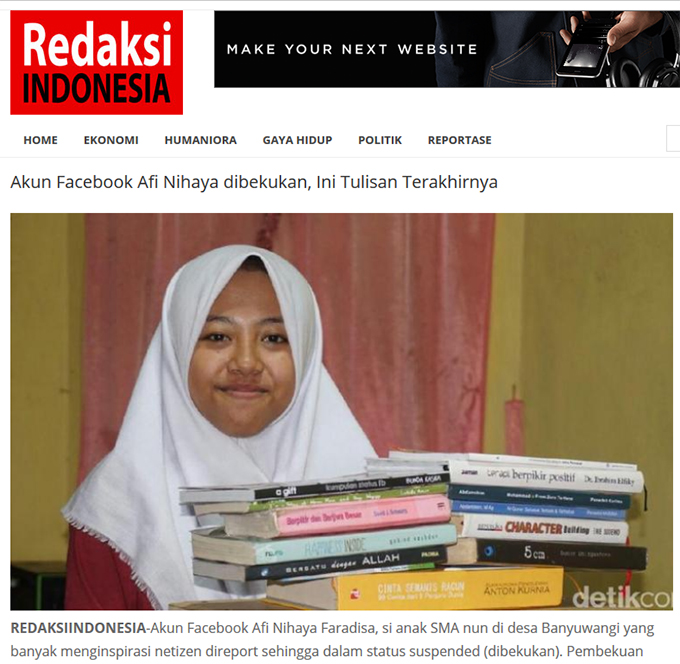
Translated by Khairiah A. Rahman
AUCKLAND (Asia Pacific Report/Redaksi Indonesia/Pacific Media Watch): The Facebook account of Afi Nihaya Faradisa, an Indonesian high school student from the village of Banyuwangi in eastern Java who has inspired thousands of netizens, has been suspended.
This suspension of Afi’s account has raised many questions on social media since she has been posting many inspirational entries that are loaded with values and insights about nationality and nationalism. At the same time that the account was “frozen”, 18-year-old Afi was featured on TV as a valued inspirational figure. The following is Afi’s last entry, entitled “Heritage”:
As it happens, I was born in Indonesia from a Muslim couple, therefore my religion is Islam. If I had been born in Sweden or Israel, from a Christian or Jewish family, is there any guarantee that today I would embrace Islam as my religion? No.
I cannot choose my place of birth and where I will live after I am born. My citizenship is inherited, my name is inherited, and my religion is also inherited.
Fortunately, I have never argued with those of different heritage because I know they too cannot choose what they have inherited from their parents and nation.
A few minutes after we are born, the environment decides our religion, race, clan and nationality. After that, we defend till death all matters that even we have never decided for ourselves.
Since infancy, I have been indoctrinated that Islam is the one religion that is true. I pitied those who are not Muslim, as they are non-believers and upon death will go to hell.
Clearly, my friends who are Christian also has the same supposition about their religion. They pity people who do not take Jesus as God, because such people will go to hell; that is the teaching of their religion.
Therefore, imagine if we do not stop pulling one another to convert to another faith, imagine if the followers of different faiths continue to compete for superiority like that, even though there will never be a meeting point.
Jalaluddin Rumi said, “The truth is a mirror in the hands of God. It fell and broke into pieces. Everybody took a piece of it, and they looked at it and thought they had the truth.” Indeed, one characteristic of followers of a religion is to claim the truthfulness of their religion. They also do not need verification; this is “faith”.
Indeed, people have the right to convey the words of God, but do not occasionally try to be God. There is no need to label others as entering heaven or hell for we are also servants.
The background of all disputes is because each heritage claims, “my group is the best because God himself said so.”
So, my question is if not God, who else created the Muslims, Jews, Christians, Buddhists, Hindu, even Atheists and looked over them all until today?
There is none that question the power of God. If He wanted, He could easily have made us all the same. Identical. One religion. One nation.
But no, right?
Does it mean that if a country is occupied by citizens of the same religion, it would guarantee harmony? No!
In fact, several countries are tumultuous even though their citizens share the same religion.
Do not be surprised that when the sentiments of the majority versus minority dominate, then our humanity suddenly disappears to who knows where.
Imagine also if each religion demands that their holy book be used as the country’s foundation. Then just wait for the downfall of our Indonesia.
Because of this, what is used by our country for policy making in politics, sentencing or humanity is not Al Quran, the Bible, Tripitaka (Buddhist scripture), Weda (Hindu scripture) or the holy book of any religion, but Pancasila, Foundational Law ’45, and the motto “Unity in diversity”.
From the perspective of Pancasila, everyone who embraces a religion is free to believe and practise their faiths, but they have no right to impose their views and religious teachings as a benchmark for assessment against the believers of other faiths.
Just because of self-righteousness, the believer of religion A has no right to intervene in the policy of a country that consists of various beliefs.
One day in the future, we will tell our descendants how the country came close to destruction not because of bombs, weapons, bullets, or missiles, but because its people claim superiority over one another, fussing over their respective heritage on social media.
While other countries have been to the moon or are planning technology that advances civilisation, we are still fussing over the question of heritage.
We don’t need to have the same thinking, but let us all have the same thought.
Footnote: It appears Afi Nihaya Faradisa’s Facebook page is active again. She has since been interviewed on various media and was invited to give a talk at an event by the Ministry of Communication and Information on Monday, May 21.
This work is licensed under a Creative Commons Attribution-NonCommercial 3




